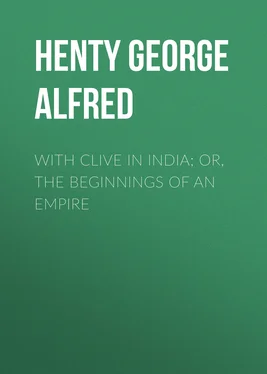George Henty - With Clive in India; Or, The Beginnings of an Empire
Здесь есть возможность читать онлайн «George Henty - With Clive in India; Or, The Beginnings of an Empire» — ознакомительный отрывок электронной книги совершенно бесплатно, а после прочтения отрывка купить полную версию. В некоторых случаях можно слушать аудио, скачать через торрент в формате fb2 и присутствует краткое содержание. Жанр: foreign_children, foreign_antique, foreign_prose, prose_military, на английском языке. Описание произведения, (предисловие) а так же отзывы посетителей доступны на портале библиотеки ЛибКат.
- Название:With Clive in India; Or, The Beginnings of an Empire
- Автор:
- Жанр:
- Год:неизвестен
- ISBN:нет данных
- Рейтинг книги:5 / 5. Голосов: 1
-
Избранное:Добавить в избранное
- Отзывы:
-
Ваша оценка:
- 100
- 1
- 2
- 3
- 4
- 5
With Clive in India; Or, The Beginnings of an Empire: краткое содержание, описание и аннотация
Предлагаем к чтению аннотацию, описание, краткое содержание или предисловие (зависит от того, что написал сам автор книги «With Clive in India; Or, The Beginnings of an Empire»). Если вы не нашли необходимую информацию о книге — напишите в комментариях, мы постараемся отыскать её.
With Clive in India; Or, The Beginnings of an Empire — читать онлайн ознакомительный отрывок
Ниже представлен текст книги, разбитый по страницам. Система сохранения места последней прочитанной страницы, позволяет с удобством читать онлайн бесплатно книгу «With Clive in India; Or, The Beginnings of an Empire», без необходимости каждый раз заново искать на чём Вы остановились. Поставьте закладку, и сможете в любой момент перейти на страницу, на которой закончили чтение.
Интервал:
Закладка:
"But she's a little bit of a thing," Charlie said. "Surely she would never venture to attack a ship like ours."
"It's the size of the guns, not the size of the ship, that counts, my boy. She has the advantage of being able to sail three feet to our two; and probably, small as she is, she carries half as many men again as we do. However, we carry heavy metal, and can give a good account of ourselves. Those thirty-twos will astonish our friend, if she comes within range."
The stranger was a large schooner, and the tautness of the spars and rigging showed that she was in beautiful order. She crossed the line upon which the merchantman was sailing, some two miles in her rear; and then, bearing up, followed in her wake.
Charlie stood near the captain, who, instead of watching her, was sweeping the horizon with his glass. Presently he paused, and gazed intently at a distant object.
"I thought so," he said to the first officer. "I fancied that fellow wasn't alone. He would hardly have ventured to try his strength with us, if he had been. Send a man up to the tops, and let him see what he can make her out to be. I can only see her topmasts, but I can make out no yards."
Presently the lookout came down, and reported that the distant vessel appeared to be a large fore-and-aft schooner, bearing down upon them.
"She will not be up for two hours, yet," the captain said. "It will be getting dark, then. It is not likely they will engage at night, but they will keep close, and show their teeth at daybreak."
It soon became known that the belief of the captain was that the vessel in their wake, and that which could be seen approaching on the beam, were French privateers; and soon all were preparing, in their own way, for what might happen. The sailors cleared the decks, and loosed the guns. The gentlemen went below, and shortly returned bringing up rifles and fowling pieces. Small arms and cutlasses were brought up, and piled round the masts.
"Why don't you put on more sail, sir?" Mr. Ashmead, the member of the council, said to the captain. "My wife, sir, objects to the sound of firearms, and I must really beg that you will increase your speed. As it is, we are losing rather than gaining upon that vessel behind. The duty of the ships of the Company is to try not to fight."
"If they can help it," the captain added quietly. "Not to fight, if they can help it, Mr. Ashmead. But unfortunately, the choice upon the present occasion lies with the gentlemen yonder, and not with us. It is not of the slightest use adding to the sail we carry, for at our very best speed, those schooners could sail round and round us. As night comes on I intend to shorten sail, and put the ship into fighting trim. In the morning I shall again increase it, but I shall not make any attempt to escape a combat which it depends entirely on those privateers to bring on, or not, as they choose. I am sorry that Mrs. Ashmead should be exposed to the unpleasantness of listening to the explosion of firearms, and that my other lady passengers should be exposed to the danger which cannot but arise, more or less, from a naval conflict.
"However, I hope, sir, that there need be no great anxiety as to the result. The Company has given us a heavy armament, and you may be sure that we shall all do our best."
Seeing the gentlemen go below for their guns, Charlie asked one of the other young writers, a lad of about his own age, named Peters, with whom he had become very friendly, to go below with him. He had not yet examined the arms that his uncle had given him, for he had not thought of them since he saw the gun cases under his berth, on his first arrival on board ship. He found the doctor already in his cabin, putting together a heavy double-barrelled gun.
"Well, youngster," he said, "so we're likely to have a brush. I see you have a couple of gun cases under your berth. You are a good deal better provided than most lads who go out as writers.
"Ah! That's a beautiful piece of yours," he said, as Charlie unlocked one of the cases and took out a rifle, "a small bore and a heavy barrel, and beautifully finished. With a greased patch and a heavy charge, that ought to carry a bullet far and true. Have you had any practice?"
"Not with this gun, sir. I used, sometimes, to practise shooting at gulls with a musket, on board the cutter my father commanded; and I got to be a fair shot with it."
"Then you ought to be able to do good work, with such a piece as that. What is in the other case?
"Ah! That's a beauty, too," he said, as he examined the double-barrelled gun. "Made extra strong and heavy, I see, so as to carry bullets. You'll find your shoulder ache, at first; but you'll get accustomed to it, in time. I'm always in favour of heavy barrels. They shoot stronger and straighter than your light guns, are not so liable to get bent or bruised, if a stupid servant drops one across a stone; and, after all, two or three pounds difference in weight does not make any material difference, when you're accustomed to it. Although, I grant, a heavy gun does not come quite so quickly up to the shoulder, for a snap shot."
"Now, Peters," Charlie said, "you take the double barrel. I will use the rifle. Mine will come into play first, but, as my uncle said when he gave it me, yours will do most execution at close quarters."
At dusk the schooners, having exchanged some signals by flags, took up their positions, one on each quarter of the ship, at a distance of some two miles.
"Do not you think," Charlie asked his friend the doctor, "that they are likely to try and board us tonight?"
"No," the doctor said. "These privateers generally depend upon their long guns. They know that we shall be on the watch all night, and that, in a hand-to-hand fight, they would lose a considerable number of men; while by keeping at a distance, and maintaining a fire with their long guns, they rely upon crippling their opponents; and then, ranging up under their stern, pouring in a fire at close quarters until they surrender.
"Another thing is that they prefer daylight, as they can then see whether any other vessel is approaching. Were one of our cruisers to hear a cannonade in the night, she would come down and take them unaware. No, I think you will see that at daylight, if the coast is clear, they will begin."
Such was evidently the captain's opinion also, as he ordered sail to be still further shortened, and all, save the watch on deck, to turn in at once. The lights were all extinguished, not that the captain had any idea of evading his pursuers, but that he wished to avoid offering them a mark for their fire, should they approach in the darkness.
Chapter 3: A Brush With Privateers
The night passed quietly. Once or twice lights were seen, as the schooners showed a lantern for a moment to notify their exact position to each other.
As soon as dawn broke, every man on board the Lizzie Anderson was at his post. The schooners had drawn up a little, but were still under easy sail. The moment that the day grew clear enough for it to be perceived that no other sail could be seen above the horizon, fresh sail was spread upon the schooners, and they began rapidly to draw up.
On the previous evening the four heavy guns had been brought aft, and the Indiaman could have made a long running fight with her opponents, had the captain been disposed. To this, however, he objected strongly, as his vessel was sure to be hulled and knocked about severely, and perhaps some of his masts cut down. He was confident in his power to beat off the two privateers, and he therefore did not add a stitch of canvas to the easy sail under which he had been holding on all night.
Presently a puff of smoke shot out from the bow of the schooner from the weather quarter, followed almost instantaneously by one from her consort. Two round shot struck up the water, the one under the Indiaman's stern, the other under her forefoot.
Читать дальшеИнтервал:
Закладка:
Похожие книги на «With Clive in India; Or, The Beginnings of an Empire»
Представляем Вашему вниманию похожие книги на «With Clive in India; Or, The Beginnings of an Empire» списком для выбора. Мы отобрали схожую по названию и смыслу литературу в надежде предоставить читателям больше вариантов отыскать новые, интересные, ещё непрочитанные произведения.
Обсуждение, отзывы о книге «With Clive in India; Or, The Beginnings of an Empire» и просто собственные мнения читателей. Оставьте ваши комментарии, напишите, что Вы думаете о произведении, его смысле или главных героях. Укажите что конкретно понравилось, а что нет, и почему Вы так считаете.












